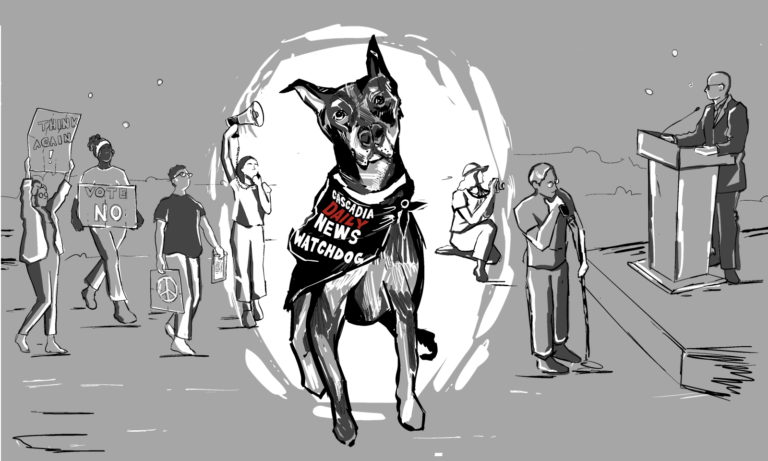The City of Bellingham plans to lobby the state Legislature for money to fund industrial cleanups and an upgraded court facility, ahead of the legislative session starting next week.
Also top of the agenda: The city is asking for “tools” to address vacancies in Bellingham’s downtown. Mayor Kim Lund said at a Monday, Jan. 6 city council meeting that the city wants to be a leader in asking the state for policy and funding options on this issue, such as “vacancy taxes,” or tools to “address illegal dumping and resolve encampments on vacant properties.”
Locals are familiar with some of those vacant properties: “In the heart of Bellingham’s downtown, a former JCPenney building has sat vacant for more than 35 years — longer than it was open for business,” city staff said in the state legislative agenda. “Despite efforts by city leaders to work with the property owner, this building remains vacant.”
The city is also “actively pursuing” efforts from the state to allow for “safe and vibrant” 2026 FIFA World Cup activities, and “access to housing for all.”
Capital funding requests
The city’s largest ask is a $3 million Model Toxics Control Act Funds grant to clean up the former RG Haley site. It’s part of a two-site cleanup project, including the Cornwall Avenue Landfill site, that will eventually become a new waterfront park. The RG Haley site cleanup will cost $28.6 million; the city allocated $16 million in local funds and was awarded a $7.3 million Public Works Board loan for the landfill part of the project, according to the draft agenda.
Lund said this project is “shovel-ready” — but the city is still dependent on state funding to complete it.
The city is requesting $1 million to relocate the Bellingham Municipal Court (plus new therapeutic court facilities) into the former federal courthouse location in downtown Bellingham. The current Bellingham Municipal Court is housed in a former church — the city says it lacks critical safety features, is considered a “failing asset” and “lacks the structural quality to legitimize further investment.”
“Pursuing this concept would leverage an existing historic resource, affordably address court needs and reinvigorate an anchor building downtown,” city staff argue in the proposed legislative agenda.
Finally, the city is asking for an additional $1 million for a project to expand children’s areas and add teen and meeting spaces in the Central Library (with a project cost of $12 million), and another $1 million to contribute to a new skate park under the Chestnut Street Bridge near the waterfront, on the site of a current DIY park.
Additionally, the city’s lobbyists intend to “actively support” efforts to ensure the city’s budget sustainability, such as preserving the Model Toxics Control Act funds despite the state’s budgetary challenges, and allowing for an adjustment of up to 3% in local property taxes to “maintain basic services.” The city also intends to support transportation efforts, like state route repairs, and efforts to promote food security and affordable child care.
This year, the city hired its own lobbyists — Nick Federici and Luke Esser — and developed its own legislative agenda, after years of sharing lobbying resources with the Port of Bellingham and Whatcom County.
“We felt it was critical that the city focus its lobbying efforts on the items that are most impactful for the city, and not trying to balance the interest of three jurisdictions across an entire county when setting priorities, and this is particularly true when it comes to discrete capital requests,” Director of Communications Melissa Morin said in an email Jan. 6.
Charlotte Alden is CDN’s general assignment/enterprise reporter; reach her at charlottealden@cascadiadaily.com; 360-922-3090 ext. 123.




